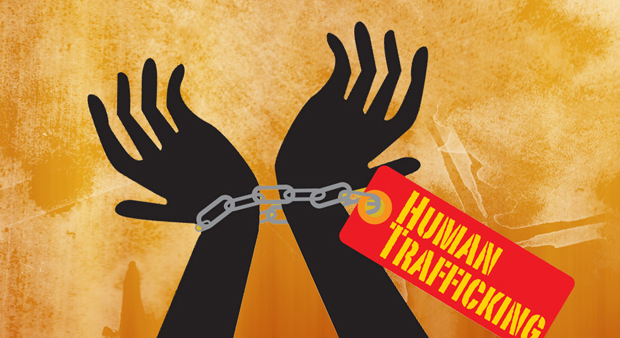A girl checks in with an older man while averting eye contact with the receptionist. A guest at the hostel bar doesn’t seem to know basic information like what city she’s in. One guy seems to answer for another when he’s asked questions. Are these just weird guests, or a sign of a bigger problem?
Disclaimer
For the purpose of this article, I will mostly be talking about the hotel industry. This is not because hostels are immune to these issues, but rather that almost all of the current research is hotel-based. That being said, this information is still valuable, and since the hostel industry doesn’t exist in a vacuum, there is plenty that we can all learn. This is not an attack on hotels or hostels, but rather illuminating a very real problem in our world and how we can help. I have pulled information from several sources, which are all cited throughout the post, as well as at the end.
What is human trafficking?
Human trafficking is a form of modern-day slavery. This crime occurs when a trafficker uses force, fraud or coercion to control another person for the purpose of engaging in commercial sex acts or soliciting labor or services against his/her will.1
The International Labor Organization estimates that forced labor and human trafficking is a $150 billion industry worldwide. Traffickers are estimated to exploit 20.9 million victims, with an estimated 1.5 million victims in North America, the European Union, and other Developed Economies combined.1,2
Trafficking can appear in many forms. It happens across all races, nationalities, economic classes, and affects both boys or girls (though victims are more often females). All trafficking victims share one essential experience: the loss of freedom.3
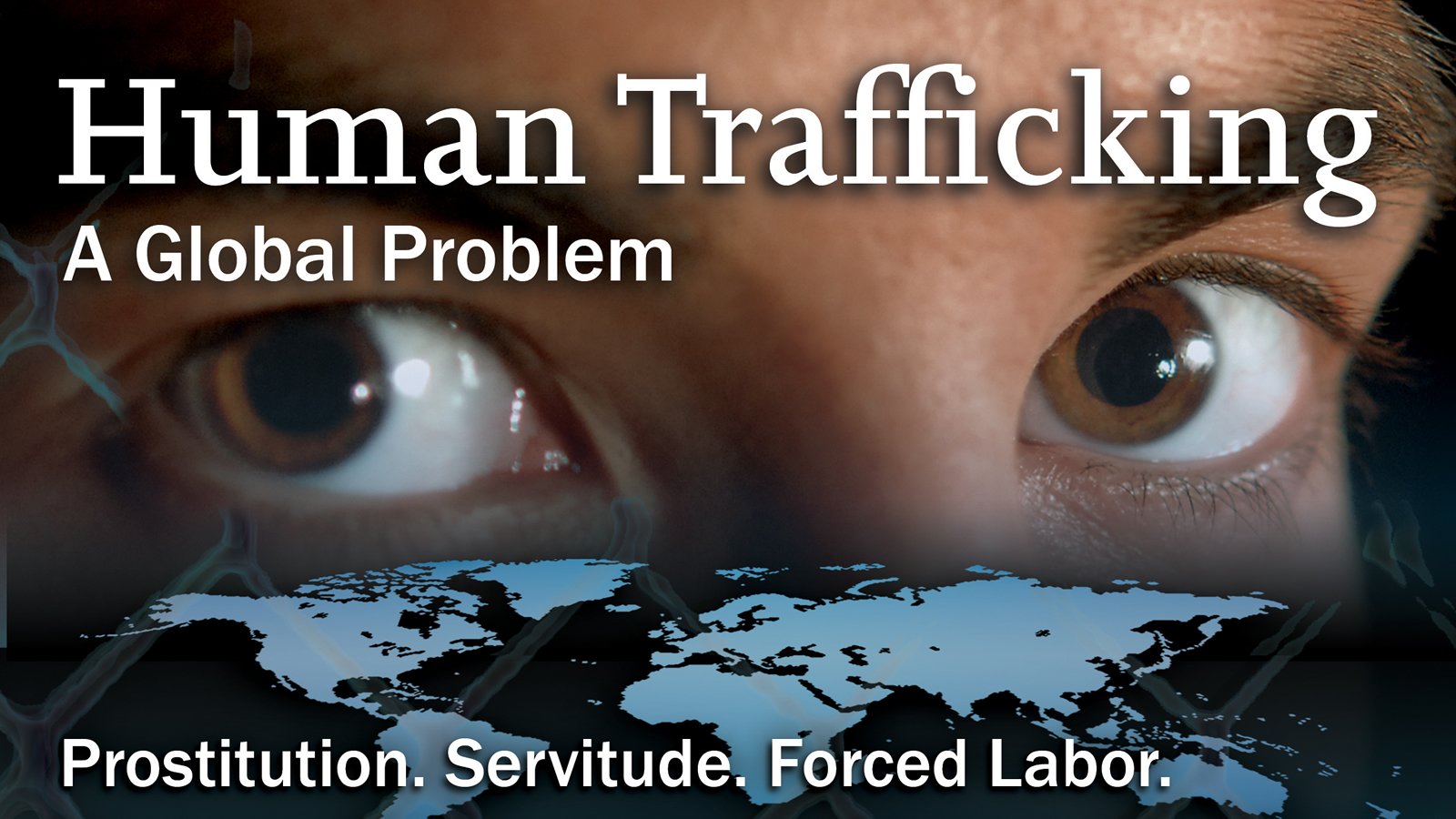
Photo credit: ice.gov
Why is the hotel industry so susceptible?
Bradley Myles is CEO of the Polaris Project, a leading anti-human trafficking organization based in Washington, D.C. Polaris provides learning resources, survivor support, and legal advocacy for victims of human trafficking.
According to Myles, the hotel industry is often unknowingly exploited since domestic sex trafficking can benefit off the ability to pay for rooms in cash, as well as change locations frequently, while those buying the sex look to hotel rooms for anonymity.4
Hotels can also be unintentionally involved in labor trafficking, but in a different way. Myles explained that many hotels will often contract with outside companies or recruitment agencies for housekeeping or maintenance. Unfortunately some companies may appear completely legitimate at first glance but actually be harboring abusive practices to employees.4
Prevention in Tourism
Being on the front lines means hotels can play a critical role in preventing human trafficking, especially in areas where people assume it doesn’t occur.
ECPAT International is the world’s leading NGO for the fight against sexual exploitation of children. "Yes, it happens, but not here" is a common thought by people all over the world, but ECPAT has a network of 90 civil society organizations in 82 countries.
Executive director of ECPAT-USA, Carol Smolenski, was quoted in a Washington Post article explaining how kids are sold everywhere from high end hotels to budget motels. “The whole industry is off the streets, so those transactions have to happen someplace. Very frequently it’s in a hotel room.” 5
Fortunately, thousands of hotels looking to thwart these abuses have signed on to “The Code”.
Short for “The Code of Conduct for the Protection of Children from Sexual Exploitation in Travel and Tourism”, The Code is “an industry-driven responsible tourism initiative with a mission to provide awareness, tools and support to the tourism industry in order to prevent the sexual exploitation of children.” 6
Tourism companies who join The Code are committed to six criteria to protect children, which include establishing policies & procedures, training employees, and reporting annually.
Of course it isn’t just children that are being trafficked. According to a mic.com article on human trafficking in Brazil, Marriot employees in Rio, while preparing for the Olympic Games, had to undergo an extensive human rights training program.7
But they didn’t stop there. They stated that the program will be translated into 14 different languages and given to the American Hotel & Lodging Association. That means 53,000 properties and 1.9 million employees will better understand what signs to look for when faced with a potential human trafficking situation.7
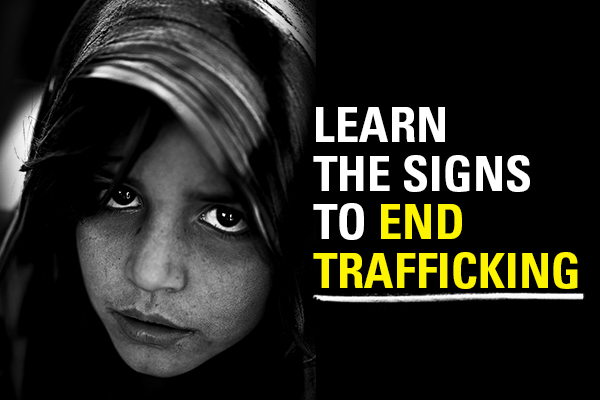
Photo Credit: Unicef
Recognizing Human Trafficking
Perhaps the hardest part about preventing human trafficking is the difficulty of recognizing it. No one sign on its own is telling of a problem, and no problematic combination looks exactly the same. However there are numerous indicators that a hotel can look out for:
-
Room paid in cash, one night at a time
-
Inconsistencies in story
-
Older man with younger woman; calls him dad or daddy
-
No control over or possession of money, cell phone, or personal ID documents.
-
Few or no personal possessions carried in small or plastic bags.
-
Avoidance of interaction with others, especially about sharing personal situation.
-
No knowledge of current and/or past whereabouts.
-
Mention of wages or work conditions different from how advertised
-
Not forthcoming about full names, home address, or vehicle info when registering.
-
Individuals leaving room infrequently, not at all, or at odd hours.
-
Individuals hanging out in hallways or appearing to monitor the area.
-
Many, many more
The above list is a combination from the many resources that offer guides on what to look for. These include the Victim and Location Indicators from the Polaris Project (here) and the Hotel Indicators Training Guide from ECPAT-USA (here). If you are looking for proper training, joining The Code involves interactive online training, with role specific training and realistic scenarios.
Training management is important, but it’s usually the staff who have more day to day interactions with your guests, and therefore potential victims. It’s important they know what to look out for.
As Michelle Guelbart of ECPAT-USA explained, "In the middle of our training sessions, we often get an 'ah-ha' moment from someone. They'll recall something they'd seen in the past, and the light bulb goes off. They may have had a gut reaction, something that wasn't quite right, but they didn't know what to do becasue they didn't have the language for it, or they didn't think it was their place to say anything. Giving them the tools and proper protocols makes a huge difference." 7
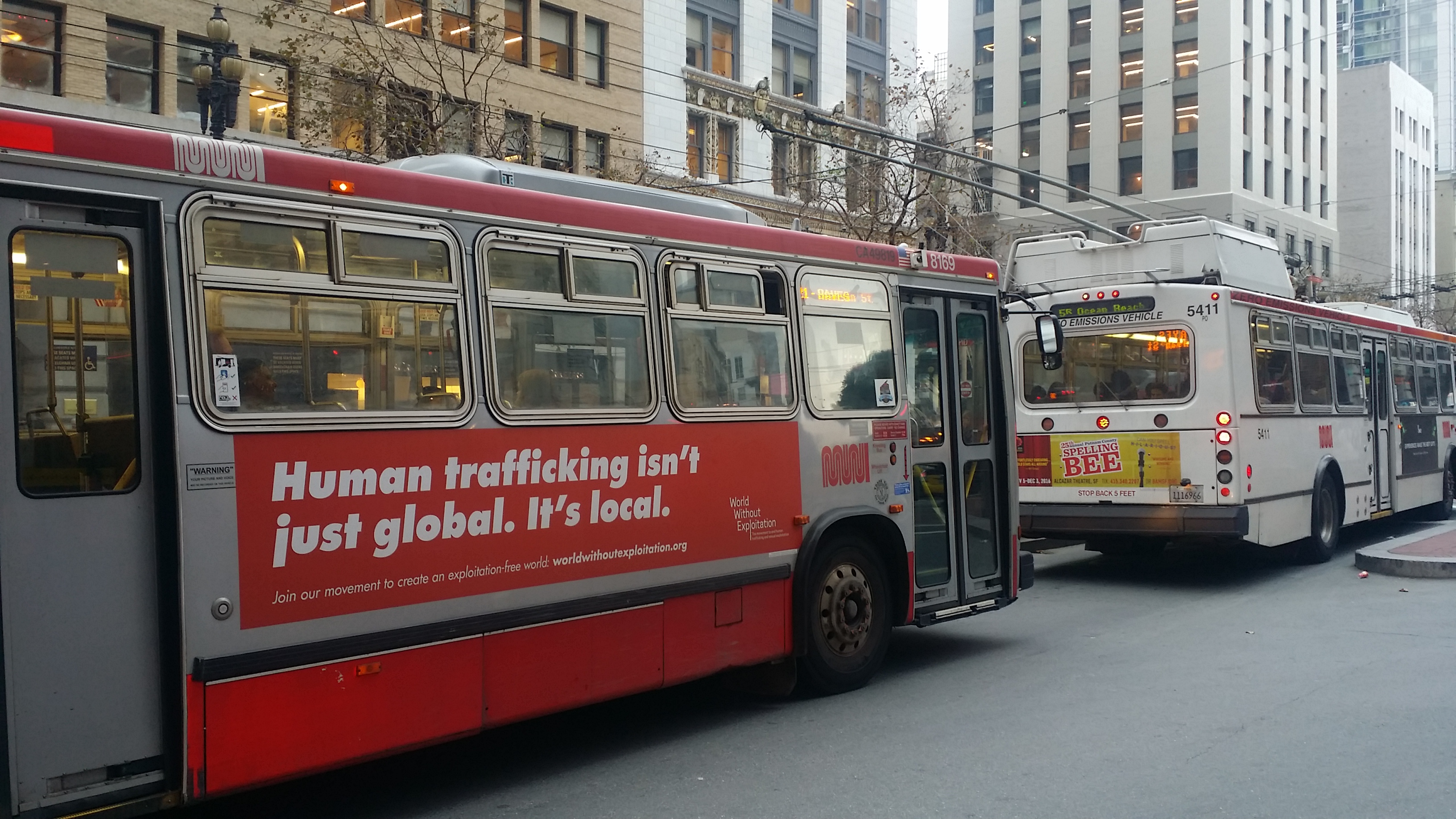
A San Francisco bus urging people to recongize human trafficking as a local problem as well. (Dec. 2016)
Suspecting Human Trafficking: What to do
No one wants to wrongly accuse, and it’s often awkward enough to turn away someone in person for a much less nefarious reason than potential human trafficking. Staff should be trained to always escalate any concerns directly to a manager, and never act on their own. If the upper management has an eye on the situation and feels there is genuine cause for concern, they can contact law enforcement or another agency trained in human traffick intervention.
This is not a call to suddenly be an expert on “what to do”, but rather be an ally on the front lines of our own industry. And according to Bradley Myles, CEO of Polaris, it’s making a difference:
“Through the National Human Trafficking Resource Center (NHTRC), which is operated by Polaris and is the country’s national lifeline for victims of human trafficking, we’ve already learned of more than 1,400 reports of human trafficking at hotels and motels. Three quarters of the reports made to the NHTRC about the hotel industry came from people who either observed suspicious activity or who had some level of contact with a potential victim. This highlights the critical role that community members and hotel workers can play in identifying potential human trafficking.” 4
If a potential situation of human trafficking is uncovered, consider the following actions steps, as outlined by the Polaris Project8 :
-
Never interfere with a situation or attempt to assist the victim.
-
Immediately alert the designated manager (General Manager, Director of Security, etc.) if indicators are observed.
-
Contact the National Human Trafficking Resource Center at 1-888-373-7888 to report tips, to connect with trained law enforcement or a local task force, or for additional resources and referrals to social service providers.
-
Call 9-1-1 for emergency situations (e.g. threats of violence, physical assault, emergency medical needs).
-
Follow existing internal protocols that govern actions when criminal activity is suspected.
These are US based, but country specific information can be found at http://www.ecpat.org/resources
A Hostel’s Role in Human Trafficking
Now there are obvious differences between hotels and hostels, and when it comes to security, hostels are often even more secure. Since most hostels require all guests to check in, regardless if they are in a private room, you already eliminate factors such as the anonymity that aides dodgy behavior, as well as avoid random people from coming and going.
That doesn’t mean hostels are off the hook though. As mentioned above, there’s no one sign of human trafficking, and recognizing it is through a combination of factors. For instance, it’s not unusual for backpackers to pay night by night because they are being spontaneous in travel plans. Hostels also get guests who don’t really fit the backpacker profile, and they can be completely legitimate. Sometimes when a couple is traveling together, one of them will carry all the important documents and money. Most guests in hostels are social, or they wouldn’t be there, but some prefer to keep to themselves.
None of those are inherent problems. But just as we always train staff to trust their gut instinct on whether or not to check someone in, we can train them to recognize a myriad of factors not lining up as a bigger problem. For example, if a non-backpacker older guest is checking in with a younger girl, seems to have control of her passport and money, pays night by night in cash, and one of both of them are evasive to normal-get-to-know you questions, it may send off a few red flags that something doesn’t feel quite right.
Another great thing about hostels is that many of actions we can take to recognize and help prevent human trafficking are simply great customer service tools we are already doing (or should be!) Getting to know our guests, introducing people to each other, asking about people’s lives or travel plans, taking guests out in town, observing behavior for anything unusual or any unmet needs-- all of these are setting hostels apart from hotels, while giving greater security and atmosphere.
Moving Forward: Technology & Awareness
The hotel industry is taking strides in addressing and preventing human trafficking, and now law enforcement can look to their guests for help. A new app called TraffickCam was developed this year to help police identify hotel and motel rooms used by traffickers selling victims. They do this through a huge database of photos uploaded by hotel guests, who take the snapshots when they first arrive to a room. These photos are then compared to those used by the traffickers online, identifying details such as carpet patterns or drapes.5,9
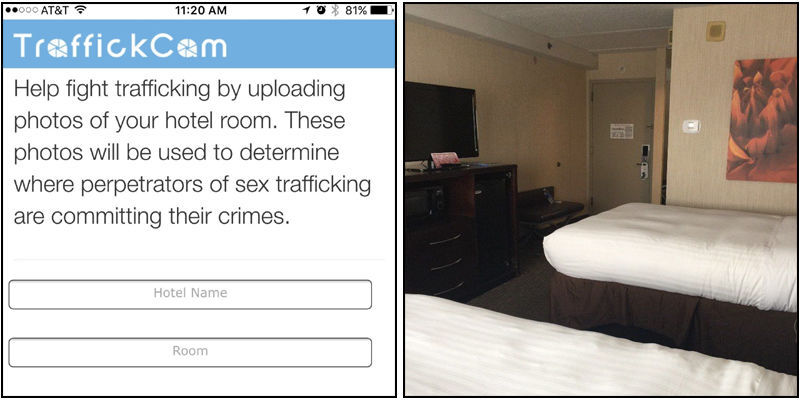
Photo credit: St. Louis Post Dispatch
According to the Exchange Initiative, a nonprofit working on solutions for ending sex trafficking, the TraffickCam app has been downloaded 90,000 times so far, with 1.6 million photos from 150,000 hotels. It's currently still in beta testing, but has an 85% match success rate and the potential to make a massive difference in rescuing victims. Spreading the awareness alone has already been a success story.10
When I reached out to TraffickCam to learn more, they explained that they were founded by Nix Conference and Meeting Management. As part of their corporate responsibility, Nix as an organization is addressing sex trafficking head on, with every hotel they do business. All hotel managers are encouraged to educate employees and sign the ECPAT Code of Conduct, to help stop and prevent trafficking in their hotels.
In Summary
It’s important to understand that just like bed bugs don’t discriminate and can end up everywhere from seedy motels, cozy hostels, and luxury 5 star hotels, human trafficking can too. It’s not a judgement on a specific hotel or hostel, as it’s so easy for human trafficking to go by undetected. But by simply being more aware of what is happening in and around our businesses, we can protect not only our traveler guests, but potentially innocent victims of modern day slavery.
Discussing sensative topics like human trafficking is not easy, but it is important. Do you have anything you can share with the community? Please sign in and comment below.
**I know many of you comment on these blogs on the site's FB page, which is great, but it would be even better to have the comments directly on here for everyone to read. Thanks for your input and helping to further our knowledge.**
In case you missed it:
<< My last post: The Real Reason We're All Here (And How You Can Help)
Just joining the show and don't know who I am? Check out my introductory blog post.
As always, send any suggestions, questions, or thoughts on the blog my way by emailing here.
Peace & love,
Courtney
P.S. Don't miss out! Follow Hostel Management on Twitter if you would like to receive updates when my new blog posts are made.
Article Citations & Sources:
1: National Human Trafficking Resource Center (NHTRC) https://humantraffickinghotline.org/
2: The Polaris Project: The Facts https://polarisproject.org/facts
3: The Polaris Project: Human Trafficking https://polarisproject.org/human-trafficking
4: “Combating Human Trafficking in the Hotel Industry” Bradley Myles, Huffington Post http://www.huffingtonpost.com/bradley-myles/combating-human-trafficking-in-the-hotel-industry_b_7840754.html
5: “An incredibly simple way your phone may help save sex trafficked children” Colby Itkowitz, Washington Post https://www.washingtonpost.com/news/inspired-life/wp/2016/07/01/how-simply-snapping-a-photo-of-your-hotel-room-could-save-trafficked-children/
6: The Code http://www.thecode.org/about/
7. “Amid Olympic Rush, Brazil’s Hotels Join the Fight Against Human Trafficking” Alex Jensen, World.Mic https://mic.com/articles/150573/amid-olympic-rush-brazil-s-hotels-join-the-fight-against-human-trafficking#.vNeeGJd40
8. Human Trafficking in Hotels and Motels Victim and Location Indicators
http://www.twolittlegirls.org/ufiles/Hotel%20and%20Motel%20Indicators%20AAG.pdf
9. TraffickCam https://traffickcam.com/about
10. TraffickCam FAQ http://www.exchangeinitiative.com/wp-content/uploads/2016/11/TraffickCam-FAQ-c.pdf

